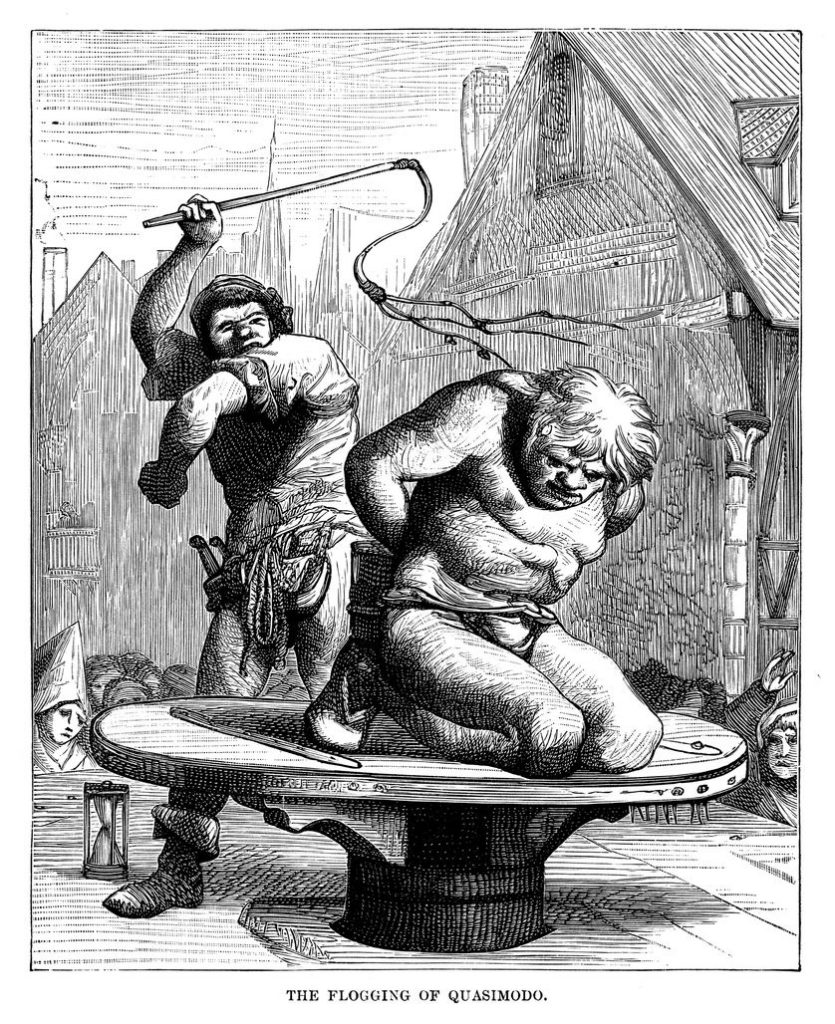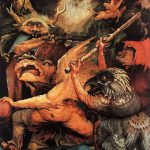Quasimodo is feared and hated by the townspeople. Looked upon by the general populace of Paris as a monster, he relies on his master Claude Frollo and frequently accompanies him when the Archdeacon walks out. He first encounters the beautiful Gypsy girl Esmeralda when he and Frollo attempt to kidnap her one night. Captain Phoebus de Chateaupers arrives to stop the kidnapping and captures Quasimodo. He later falls in love when she gives him water as he is being punished at the pillory.
Esmeralda is later entangled in an attempted murder and sentenced to hang for both the attempted murder and witchcraft. As she is being forced to pray at the steps of Notre Dame just before being marched off to the gallows, Quasimodo slides down with a rope, and rescues her by taking her up to the top of the cathedral, where he poignantly shouts “Sanctuary!” to the onlookers below.

However, Quasimodo is never loved by Esmeralda (the main theme of the book being the cruelty of social injustice); although she recognizes his kindness toward her, she is nonetheless repulsed by his ugliness and terrified of him, however unfairly. (In the 1982 television film The Hunchback of Notre Dame, she kisses him goodbye at the end; something that does not occur in either the book, nor any other film version of the novel.) He continues to watch over her and protect her regardless, and one point saves her from Frollo (and stops short of killing him) when the mad priest assaults her in her room.
After an uneasy respite, a mob storms Notre Dame, and although Quasimodo tries to fend them off the mob continues attacking until Phoebus and his soldiers arrive to fight and drive off the assailants. Unbeknownst to Quasimodo, Esmeralda is lured outside by Frollo and subsequently seized and hanged. In despair, Quasimodo murders his former benefactor, Frollo, when he realizes that he has sealed Esmeralda’s doom in hopes of quelling his lust for her. He leaves Notre Dame, never to return, and later goes to Mountfaucon (a huge graveyard in Paris where all hanged bodies are thrown) where the bodies of the condemned are dumped and dies clutching Esmeralda’s body. Years later, an excavation group finds both their skeletons intertwined. When they try to separate them, Quasimodo’s bones crumble into dust.
Quasimodo’s name can be considered a pun. Frollo finds him on the cathedral’s doorsteps on Quasimodo Sunday and names him after the holiday. However, the Latin words “quasi” and “modo” also mean “almost” and “the standard measure” respectively. As such, Quasimodo is “almost the standard measure” of a human person.
In the novel, he symbolically shows Esmeralda the difference between himself and the shallow, superficial, self-centered, yet handsome Captain Phoebus with whom the girl is infatuated. He places two vases in her room: one is a beautiful crystal vase, yet broken and filled with dry, withered flowers; the other a humble pot, yet filled with beautiful, fragrant flowers. Esmeralda takes the withered flowers from the crystal vase and presses them passionately on her heart.








